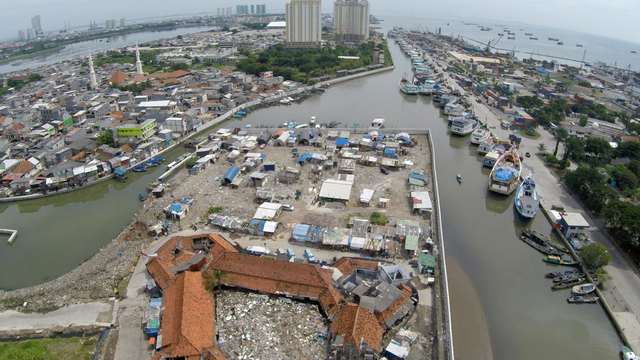
- This event has passed.

RCSD is pleased to invite you to participate in a thesis examination, “Play the Eviction and Livelihoods of the Akuarium Neighborhood in Jakarta’s Transformation” presented by Achmad Firas Khudi, M.A in Social Science, specializing in Development Studies, on Tuesday, 30 May 2023, starting 8 am, online through the following link: https://cmu-th.zoom.us/j/99361216637 (Zoom Meeting ID: 993 6121 6637)
Examining Committee:
Prof. Dr. Ian Baird (University of Wisconsin-Madison, U.S.A)
Asst. Prof. Dr. Prasit Leepreecha (Faculty of Social Science, Chiang Mai University)
Asst. Prof. Dr. Chusak Wittayapak (Faculty of Social Science, Chiang Mai University)
Abstract:
In 2016, the Jakarta government evicted the urban community of Kampung Akuarium in North Jakarta for urban transformation. The urban transformation created a new urban life in Jakarta with progression but marginalized a particular Akuarium people. The current condition shows that urban transformation has simultaneously modernized the city’s spaces and the existence of people with access to wealth but neglected people experiencing poverty. In contrast, urban development has displaced the homes and spaces, the material existence, and the livelihoods of the Akuarium people. Akuarium, whose homes and lives are disrupted by development, has no choice but to navigate the new physical landscapes. The disruption of living areas and homes further responded to resistance and identity despite the material loss. Urban transformation through eviction and gentrification recreated the Akuarium people into an oppressed state and enunciated actions to defend their rights
The Jakarta urban heritage program caused the eviction of Kampung Akuarium, an urban settler moved forcibly in 2016 by mobilizing many Indonesian apparatuses. Governor of Jakarta Basuki T.P./Ahok executed heritage programs that evicted the space of Akuarium people. The meaning of kampung is associated with a living area or neighborhood in the Indonesian context. The heritage program concerns the old town of Jakarta and represents the force of urban policy in changing the urban landscape.
Given its significant role in their vicinity, the Jakarta government and the general public could not simply mention the Akuarium community as an illegal occupant. The history of the Akuarium community started in the 1970s when their elders stayed in the fish laboratory of the Indonesia Institute of Science/LIPI. Akuarium neighborhood was formerly known as the Laboratorium of National Oceanography of LIPI, where there were big aquariums for conserving and examining fish. In light of the background, the research realized how urban eviction led to precarious urban life and could enact intelligence and survival in the Akuarium people. The study examines the Akuarium community with two research objectives. First, the study examines how the Akuarium people respond to the urban transformation. Second, it aims to identify what kind of urban transformation changes the economy and identity of the community.
The research results include an analysis of the response, economy, and identity of the Akuarium people against the Jakarta urban transformation. Such results, in theory, cover an examination of livelihoods and urban play in urban transformation. There are socio-economic and immaterial difficulties arising upon eviction. Such problems appear from destroyed livelihoods. Yet, violent eviction instigated a kind of play in the community. A theory of urban play envisages how the community responds and utilizes failed development projects drawing from the practices of graffiti, car jockeys, and navigation of traffic jams. The research method includes field and internet ethnography for around one year. Field ethnography has been conducted for approximately one month and a quarter, while internet ethnography for approximately eleven months.
The research uncovers worsening precarious life, plunging the Akuarium community from poverty to severity. The severity includes massive loss of occupations, and houses, unexpected mitigation costs, the loss of markets and crowdedness for market support, and the multi-source of income as in small shops and housing rental. Their poverty informs a structural problem of low income worsened due to eviction. The eviction exacerbates the condition with the erasure of the economy, housing, and cultural life, leading to a repressed mental state among them. In identity, the struggle against eviction revived the community and a wide range of urban activists to remake the destroyed neighborhood, demanding rights in both formal and informal ways. Akuarium people also show a category of irregular workers and businesses in the urban economy of Jakarta. Most people work temporarily and have small businesses such as shops, food stalls, or street vendors to fulfill their daily needs.
The Akuarium people enact an urban play as a small tactic for survival, responding to various kinds of violence and the difficulty of eviction. The urban play includes mothers who brought appliances and mobilized small mobs. Mothers also opened their clothes with only underwear covering the breasts and sexual organs to seek the empathy of apparatuses for stopping the eviction. Akuarium people showed urban play as a claim of space without aggression and worked as a last-resort weapon to sustain community life. The play has been an archetype of resistance through spatial practice.
>>Your attendance is highly appreciated<<
